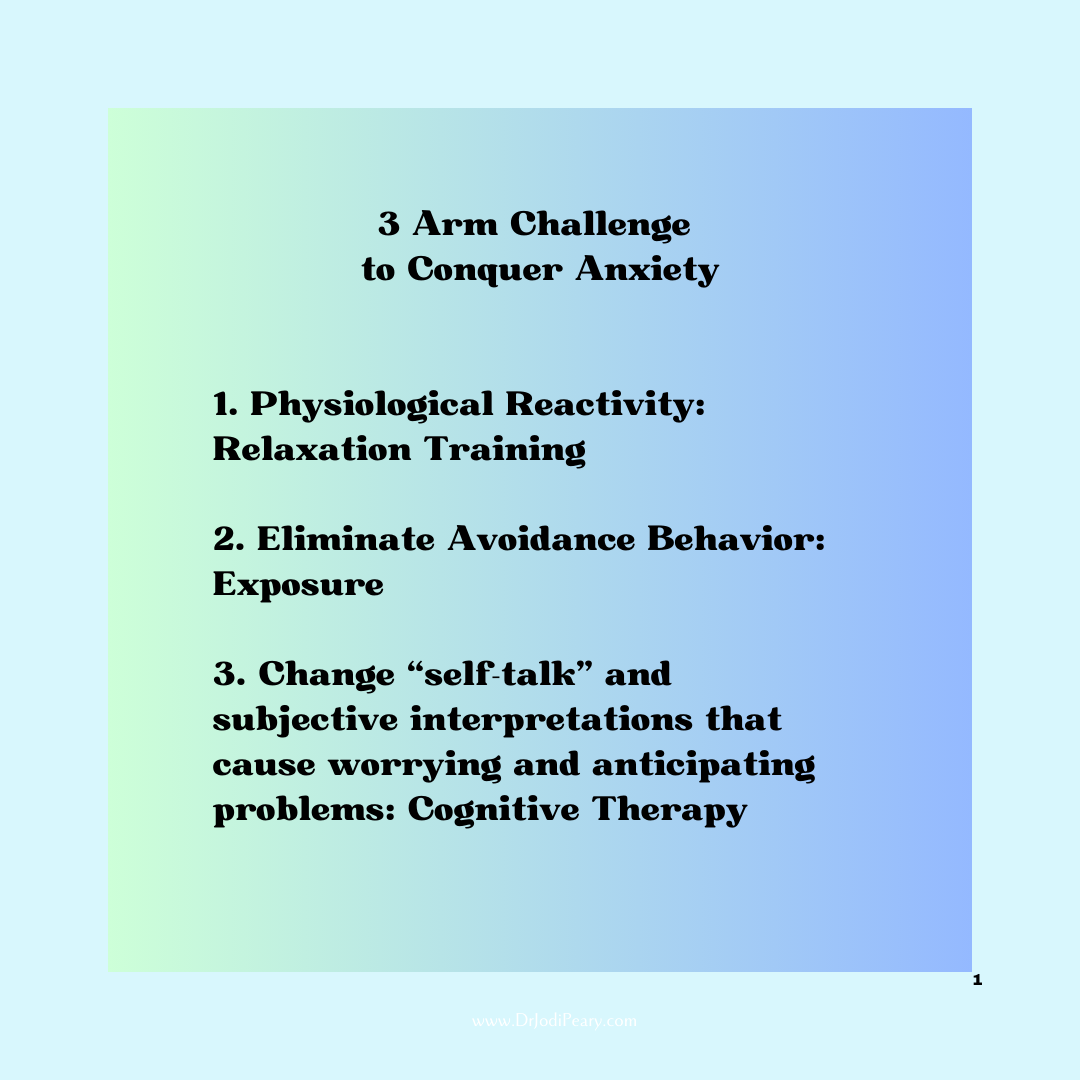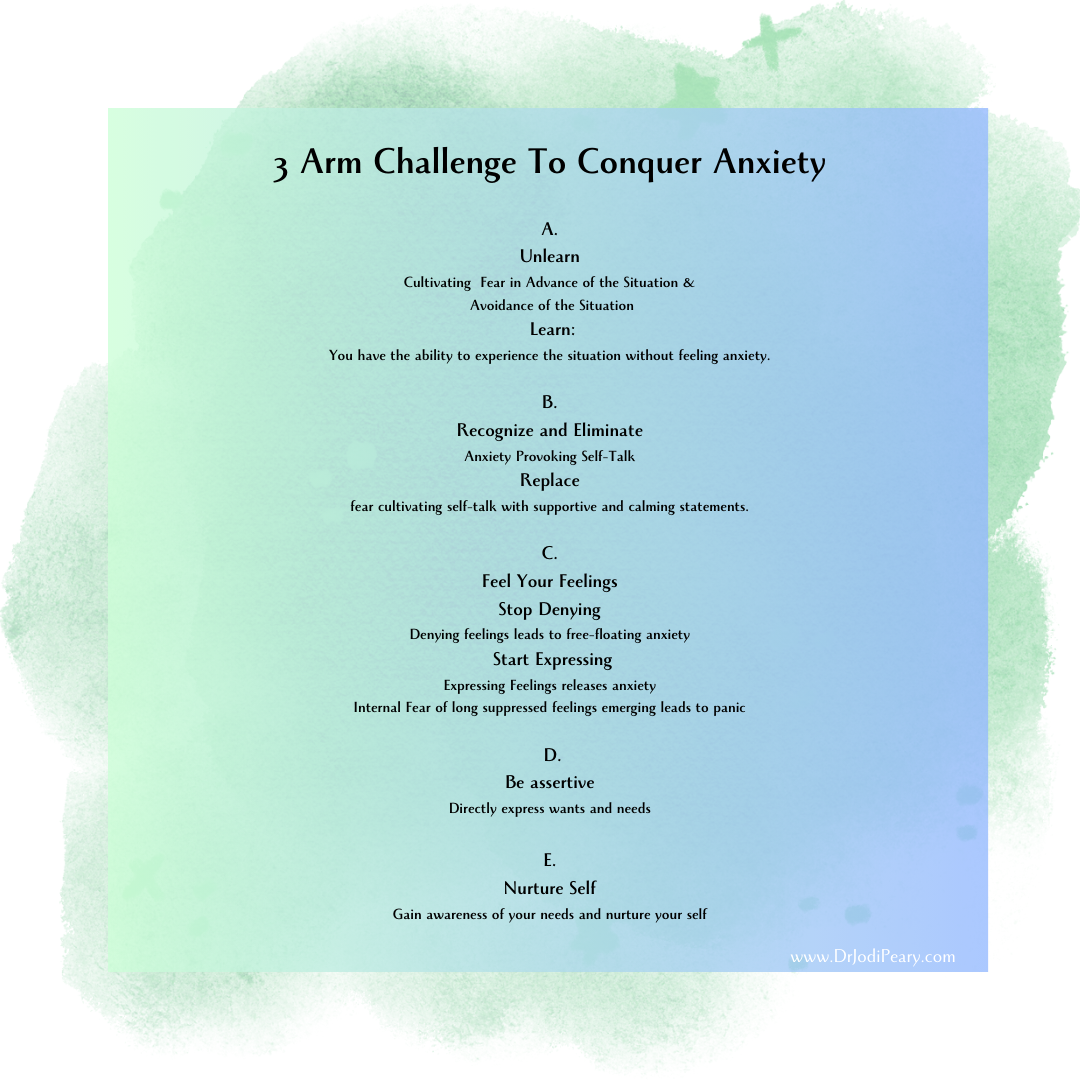Conquering Anxiety Physiologically, Behaviorally, and Psychologically

Conquering Anxiety Physiologically, Behaviorally, and Psychologically
If you experience anxiety, you know it impacts how you feel in your body, how you behave, and how you think and feel. Anxiety isn't just something you have imagined or a thought in your head. Anxiety affects us physiologically, behaviorally, and psychologically.
Anxiety at the Physical Level:
Shallow Breathing & Muscle Tension
Practice Deep Breathing and Muscle Relaxation
Anxiety at the Emotional Level:
Suppressed feelings create anxiety
Recognize symptoms of repressed feelings
ID what you are feeling
Learn to express feelings
Anxiety at the Behavioral Level:
Avoidance creates and maintains phobias
Take small steps and process through imaginary and real life desensitization
Anxiety at the Mental Level:
Notice and replace “what-if”, self-critical, and perfectionist self-talk.
Because anxiety affects us physiologically, behaviorally, and psychologically, to conquer it we must intervene on all 3 levels. We conquer anxiety most effectively and long term by reducing our physiological reactivity through the use of relaxation training, by changing our avoidance behaviors and increasing our exposure to the stressors, and by challenging our self-talk (the voice in our heads or the stories we tell ourselves) and our perspectives that keep us worrying and predicting problems.

What Turns Situational Anxiety Into A Phobia?
Situational anxiety is anxiety that only arises in particular situations. If one does not generally experience anxiety but consistently experiences anxiety in particular situations, such as when on an airplane or when the doors close on an elevator, that experience is situational anxiety. Anticipatory anxiety arises when the person with situational anxiety becomes nervous about facing the situation that consistently causes anxiety. However, situational anxiety and anticipatory anxiety do not rise to the level of becoming a phobia until the individual begins to avoid the situation that triggers the anxiety. A phobia arises
when one associates a particular activity with something one is afraid of and conditions one's self
to remain fearful by avoidance of the situation that triggers the anxiety.
Fear alone does not create the phobia.
Avoidance creates phobia.
We learn to be phobic by avoiding what causes fear.
The more we avoid, the more the fear becomes rooted.
Anxiety may be caused by many different instigators including heredity, significant personal loss, and
significant life change. These causes are often outside of our control. It is a part of life to experience fear and uncertainty. We all experience situations which contribute to our feeling anxious. However, the maintaining causes of anxiety are often within our control.
The Ways Anxiety Becomes Deeply Rooted
Anxiety can come and go, rise and fall. The following are ways we invite anxiety to not only stay with us but to grow.
Maintaining Causes of Anxiety:
Avoiding phobic situations
Anxious Self Talk
Mistaken Beliefs
Withheld Feelings
Lack of self-Nurturing
Lack of Assertiveness

Curing acute or clinical levels of anxiety and phobias occurs as a result of learning and unlearning, mindfulness of our inner narratives, feeling our feelings, gaining awareness of our needs, expressing our wants and needs, and nurturing our selves.
Before diving into your holistic elimination of anxiety, set a strong foundation for yourself by journaling answers to the following questions:
What are the most important positive changes I want to make in my life?
What would a complete recovery from my present condition look like?
How will I think, feel, and act in work, relationships and relationship with self once recovered?
What new opportunities will I take advantage of once recovered?
If you would like practical step-by-step guidance in an alternative holistic approach to healing from anxiety, don't hesitate to get in touch and schedule a Conquering Anxiety Coaching Session with me. I would be honored and delighted to work with you.



